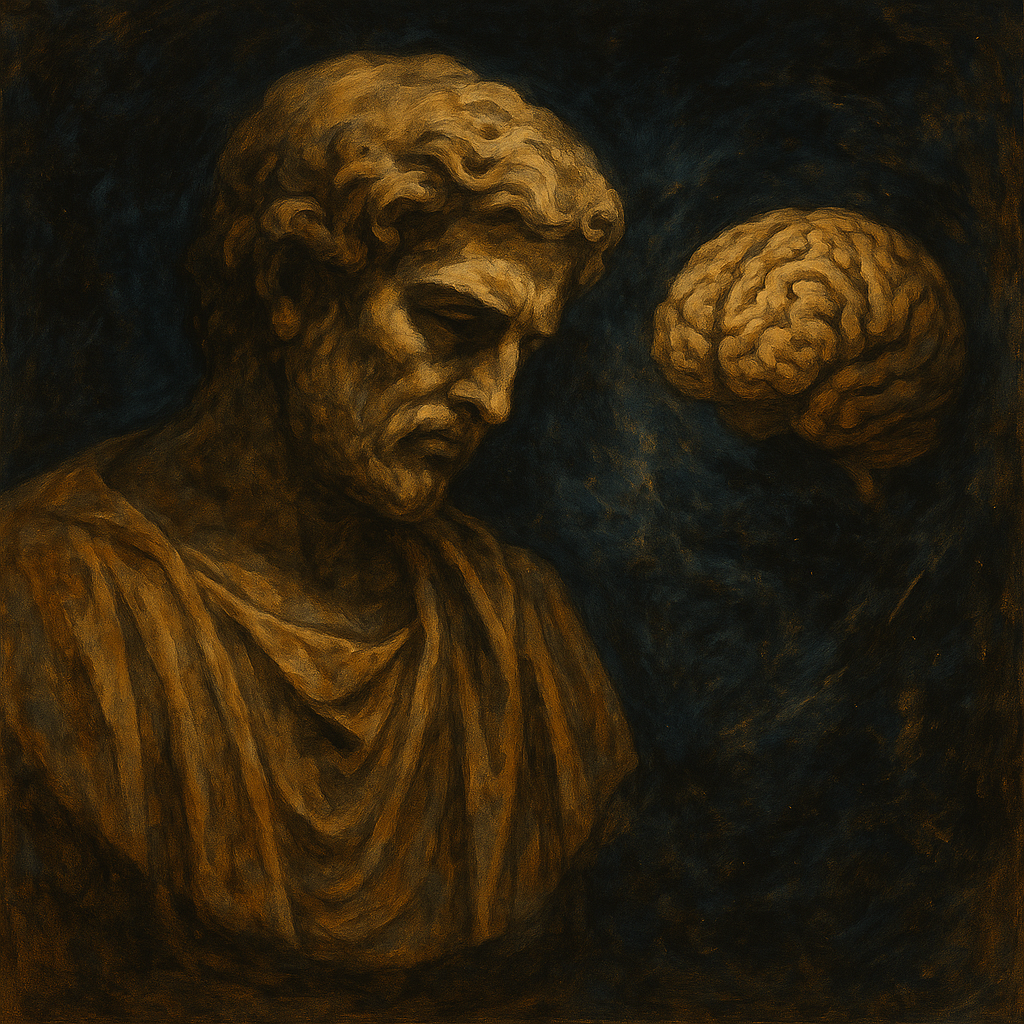Now I want you to think about the last person you helped. If you remember, think about this: "If that person didn't see you and didn't know it was you who helped them, would you still help them?"
Let's take an example:
Let's say an elderly person is standing in the subway and we are sitting. Let's examine this good deed:
- If there were no other people in the subway and there was only one seat, and we were sitting and we saw the old person, would we still give him/her a seat?
- Could we be doing this act of kindness so that people would say "what kind people there are"?
- Did we really do it for pure goodness?
In this week's article, we will question the invisible layers of kindness together through intention, expectation and inner impulses.
As always, let me try to list my perspectives:
Philosophical perspective:
In my previous articles I have mentioned Aristotle's eudaimonia.
According to him:
"Virtue is the habitual correct behavior that enables a person to live well."
Now let us examine this "virtue". According to Aristotle:
1- There are two kinds of virtue:
- Intellectual virtues: Wisdom, insight, common sense (developed through experience and reason)
- Moral virtues: Character virtues such as courage, temperance, generosity, justice (developed by habit)
2. The principle of the Golden Middle (mesotes):
This is Aristotle's best-known principle:
Virtue is a point of balance between two extremes.
That is, to be virtuous is to stand neither "in excess" nor "in deficiency" of an action.
|
Three Deficiencies |
Virtuous Balance |
Three Redundancy |
|
Fear |
Courage |
Activity |
|
Scrooge |
Generosity |
Extravagance |
|
Shyness |
Humility |
Self-righteousness |
That is, even if someone appears to be "very charitable," it is not virtuous if it is ostentatious.
3. Emphasis on intention and habit:
According to Aristotle, for a behavior to be virtuous:
- It must be done by conscious choice (i.e. not at random)
- It must be done for the right purpose
- It must be habitual (not a one-off)
Therefore he says:
"One-time courage does not make you brave. He who is in the habit of acting courageously is courageous."
______
I cannot go into this subject and not mention Kant.
Kant, in the first chapter of his 1785 fundamental moral work, The Grounding of the Metaphysics of Morals, says:
Nothing in the world is good except a good will, as pure good.
That is:
- What we do may have a good result, but if our intention is not "good", it does not make us morally worthy.
- Being a good person requires doing good things for the right reason before "doing good things".
____
Nietzsche's critique of even virtue being tainted by self-interest:
According to Nietzsche, even the idea of "virtue" as taught by society has been corrupted.
In his view, virtue is a tool of moral manipulation invented by the weak to restrain the strong.
Nietzsche, especially in "Beyond Good and Evil" (Jenseits von Gut und Böse) and
"On the Genealogy of Morals" (Zur Genealogie der Moral), argues that
"Virtue" is in fact the suppression of man's inner strength, impulses, desires.
Society glorifies the suppression of one's own nature as 'virtue'. But this makes man weak, hypocritical and false.
What does it mean that "even virtue is tainted by self-interest"?
According to Nietzsche:
- Virtuous behavior is often done not because it is truly good, but in order to gain acceptance in society, to avoid punishment, to win love or to gain superiority.
- So even virtue is in fact infected with self-interest.
He summarizes it as follows:
"Virtue is a mask that people wear to rise in the eyes of others."
And he adds:
"The most dangerous habit of man is that he lies even to his own good."
I know, it's a bit confusing. First we went to Kant who said virtue, then to Nietzsche who stomped virtue into the ground.
I am moving in the direction of creating my own philosophy of life using the grains of knowledge that I have distilled and assimilated by approaching all the information I have reached equally, and I recommend it to you.
Let me try to approach it from a scientific perspective:
Scientific Perspective - Why Do Good?
Modern psychology and neuroscience reveal several basic systems behind human good behavior:
1. Social Brain Theory
According to this theory:
- The human brain has evolved to be accepted in social environments.
- Helping others helps to gain respect within the group.
- Therefore, many "acts of kindness" are unconsciously motivated by status and belonging rather than goodness.
2. Dopamine and the Reward System
- When we help someone, our brain releases dopamine (the pleasure chemical).
- This means that doing good not only for the other person but also for us creates a chemical "feel good" state.
- Therefore, "altruism" often serves ourself as well.
3. Moral Licensing
- In one study, after people did a "good deed", they found themselves more tolerant of unethical behavior later.
- For example: "I made a donation today, I can indulge myself a bit."
- This shows that: "Kindness" can also work psychologically as a means of entitlement.
4. Bystander Effect"
- In a crowded environment, less help is given to someone who needs help.
- Because everyone looks at each other, responsibility is distributed.
- This suggests that in an unconscious community goodness tends to be postponed or ignored.
In conclusion:
Giving is a complex act with neurological, psychological and social dimensions.
And not every "good deed" is born out of truly good intentions.
I love digging deeper like this, because it makes me ask myself questions like "are we good because we are good, or are we good because it is more convenient for us to be known as good by others?" and I start to feel like my horizons are expanding.
Let's get to the bottom of the real problem:
How has goodness changed in modern society?
I leave it to you to interpret whether being visible and receiving interaction in the age of social media has emptied the concept of "goodness" or made it stronger.
On the one hand, those who rush to help those in need...
On the other hand, those who beg for help when they don't need it...
How much has the meaning of goodness been preserved in society?
Does helping the underdog feel like goodness to us?
Does staying out of things as long as they don't touch us make us a better person?
Does keeping silent against the oppressor make us good or oppressors?
My personal opinion is that we should make goodness and virtue our basic and independent default characteristic and spread it.
I would be remiss if I didn't make an observation from my own life.
In the early days of my marriage, when my awareness and my ignorance from growing up in a patriarchal environment was close to zero, I used to help my wife with the housework and expect appreciation for it.
In time, as I looked inside myself, I realized that this was not even a help, it was already my duty as I was a person living at home.
The comfort zone disguised with the mask of kindness does us no good, even if it hurts at first to see this, it is good for inner peace in the long run.
Let's look at how we can make kindness conscious:
Is Conscious Kindness Possible?
I would like to answer this question by branching out a bit;
What is needed for real goodness?
- Awareness: We need to realize our intentions, if they are bad, we need to fix them, if they are bad, we need to change them into good.
- Lack of expectation: If we expect something in return for the good we do, it is conceptually more like a transaction than a good deed. It does not lead to good, so we should not have expectations.
- Sincerity: Goodness should be done sincerely, it should not be treated as a trump card. If sincerity disappears, goodness disappears.
Is goodness an identity or an action?
The perception that we do a good deed because we are a good person kills goodness a little bit. It is enough if we know that the action is done with a good intention and to lead to a good situation.
It may be a bit extreme, but even giving money to a beggar in order to go to heaven may undermine the purity of goodness.
It seems more sincere to me to think that there is a person in distress, and if I do him some good, he will be better off, and leave him there than to intend to go to heaven.
To summarize:
Goodness is not just something done; it is an intention carried. I am trying to say that our intention should be to cause good and we should perform the action in this way.
In our culture, there is a sentence that says what the right hand gives, the left hand should not know.
They say that true goodness is silent.
When was the last time you did a good deed without anyone knowing?"
With this article, we tried to look at the intentions and unconscious motivations behind the concept of goodness rather than its visible face.
What if it is not just goodness?
Could it be that in almost every aspect of our lives - in our relationships, in our decisions, in our beliefs - we have surrendered to various logical errors and fallacies without realizing it?
In the next article, we will discuss these thought traps that guide us with invisible strings and the philosophical "razors" we can use to deal with them.
Is it possible to think truly free?
And can this freedom be the key to a genuine life?
We will meet again in pursuit of these questions...
Till then, stay in love.





